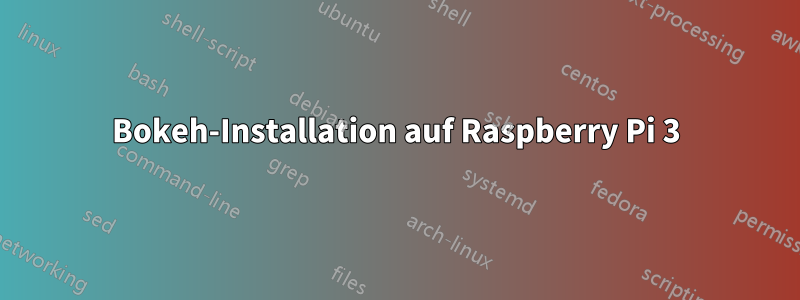
Hallo, hat jemand versucht, Bokeh auf einem Raspberry Pi zu installieren?
Wenn ich versuche, ein Diagramm in einer HTML-Datei zu generieren, wird mir folgende Fehlermeldung angezeigt:
python3 test1.py
Traceback (most recent call last):
File "test1.py", line 1, in <module>
from bokeh.plotting import figure, output_file, show
File "/usr/local/lib/python3.5/dist-packages/bokeh/plotting/__init__.py", line 57, in <module>
from . import figure as _figure
File "/usr/local/lib/python3.5/dist-packages/bokeh/plotting/figure.py", line 26, in <module>
from ..core.properties import Any, Auto, Either, Enum, Int, List, Seq, Instance, String, Tuple
File "/usr/local/lib/python3.5/dist-packages/bokeh/core/properties.py", line 255, in <module>
from .property.dataspec import AngleSpec; AngleSpec
File "/usr/local/lib/python3.5/dist-packages/bokeh/core/property/dataspec.py", line 40, in <module>
from .visual import FontSize, MarkerType
File "/usr/local/lib/python3.5/dist-packages/bokeh/core/property/visual.py", line 29, in <module>
import PIL.Image
File "/usr/local/lib/python3.5/dist-packages/PIL/Image.py", line 94, in <module>
from . import _imaging as core
ImportError: libopenjp2.so.7: cannot open shared object file: No such file or directory
Es ist jetzt mit pip3 installiert, aber ich habe auch pip ausprobiert, es ist auf einem Vanilla-RPI-Image installiert.
Für mich sieht es so aus, als ob ein Paket fehlt, aber ich bin kein Python- und auch kein Bokeh-Experte.
Antwort1
Eine .so-Datei (Shared Object) ist eine kompilierte Bibliotheksdatei in Linux – ähnlich den DLL-Dateien (Dynamic Linked Library) von Windows. Es sieht so aus, als ob eine der Abhängigkeiten in Ihrem Projekt die libopenjp2.so.7Bibliothek erfordert. Stellen Sie sicher, dass sie mit Folgendem installiert ist:
sudo apt-get install libopenjp2-7
Sie könnten dann versuchen, den Cache der gemeinsam genutzten Linux-Bibliothek zu überprüfen, um festzustellen, ob es dort vorhanden ist.
ldconfig -p | grep 'libopenjp2.so.7'
Das Ergebnis sollte ungefähr so aussehen:
libopenjp2.so.7 (libc6,x86-64) => /usr/lib/x86_64-linux-gnu/libopenjp2.so.7
Wenn Sie nichts sehen, versuchen Sie, den Cache mit folgendem zu aktualisieren:
sudo ldconfig


